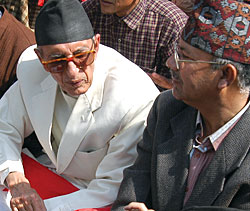 MIN RATNA BAJRACHARYA |
After the fall of the Maoist-led government, the NC, as the second largest party in the legislative parliament, was entitled to take the reins of government. But Koirala probably didn't wish to sow seeds of disagreement in a party still struggling with its unification process with a former breakaway group. When the NC didn't stake its claim to leading the government, UML leader Jhalnath Khanal should have been the rightful choice.
Khanal was perceived to be too close to the Maoists for India's comfort. Koirala thus consented to give Madhav Kumar Nepal a chance on the assumption that he would be consulted. The appointment of daughter Sujata Koirala as deputy premier was an implicit condition.
Once ensconced in Baluwatar, Nepal didn't need Koirala anymore. He deduced accurately that as long as his anti-Maoist 'international community' constituency was intact, the NC wouldn't dare unseat him. Apparently, the Congress patriarch has failed once again to correctly assess the UML's visceral antagonism against his party in general and the Koirala family in particular.
Since the mid-nineties, the UML has succeeded in attracting a large number of self-employed professionals, small entrepreneurs and something it calls 'nationalist' capitalists to its fold. But the petty bourgeoisie continues to be the mainstay of the Balkhu establishment. Avowedly conventional in its beliefs and outlook, the lower middle-class hates proles. But it detests the elites even more. Since the time of BP Koirala, Ganesh Man Singh, Subarna Shamsher and Ram Narayan Mishra, the NC has relentlessly been portrayed as an elitist party. UML stalwarts are actually more comfortable in the company of the RJP or RPP, the political platforms of former Panchas with whom they worked during the time of absolute monarchy to resist the penetration of the NC into urban areas. Nepal knows his cadres aren't comfortable working with the NC as a coalition partner and doesn't want to antagonise them.
Premier Nepal has been in Nepali politics long enough to be aware of the risk of inviting Koirala's ire. But his core constituency in New Delhi isn't willing to cede an inch of political space to the Koiralas. A senior sleuth, who worked behind the scenes for the formation of Premier Nepal's anti-Maoist coalition, was recently heard remarking,
"I have four years to go before I retire. By that time, I will make sure the Koiralas are history." He may have been merely massaging Nepal's bruised ego, but the discredited leader of the UML has apparently begun to believe that he is indispensable for now.
Despite a concerted disinformation campaign against the Maoists, it's Madhav Kumar Nepal's hubris that lies at the centre of the parliamentary deadlock in the Constituent Assembly. Under Nepal's leadership, the UML boycotted the entire winter session of Parliament in 2001, so he must know the difficulty of extricating an opposition party from a self-destructive, confrontational course. Even though the Maoists know the prolonged impasse in Parliament will ultimately harm them more than any one else, they just can't let it go without extracting at least a face-saving compromise.
Koirala and Nepal need to accept that there is no place for their old antagonism in the present scheme of things. They may have been movers and shakers once, but the main players in the political arena now are the Maoists and the Madhesis, as well as whoever hates or loves them strongly enough to meddle in the internal affairs of another country.
Koirala and Nepal need to make peace with Pushpa Kamal Dahal for their own good and for the future of peace and democracy in the country.
READ ALSO:
Turning the key- FROM ISSUE #468 (11 SEPT 2009 - 17 SEPT 2009)
Nepal and Koirala - FROM ISSUE #468 (11 SEPT 2009 - 17 SEPT 2009)



